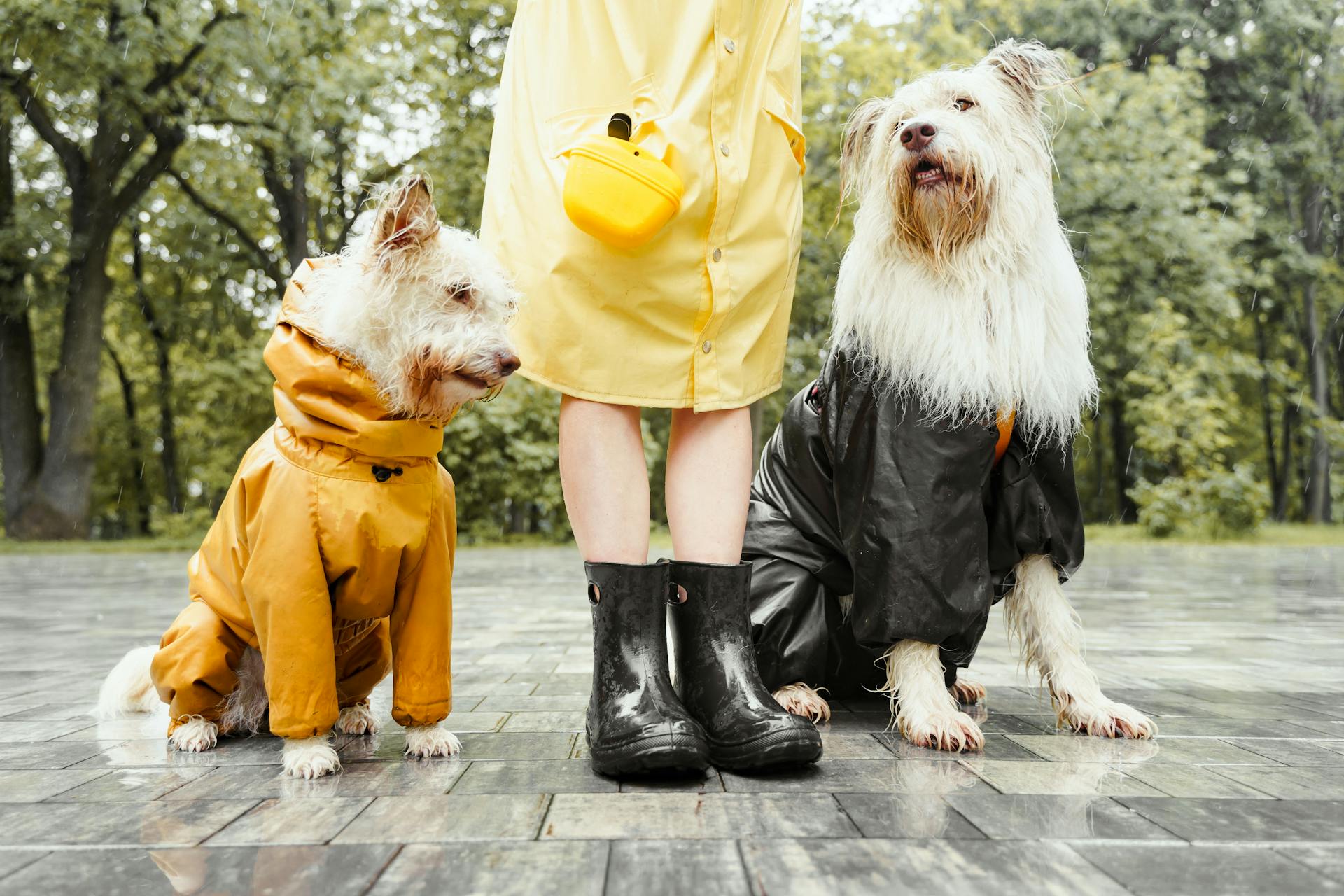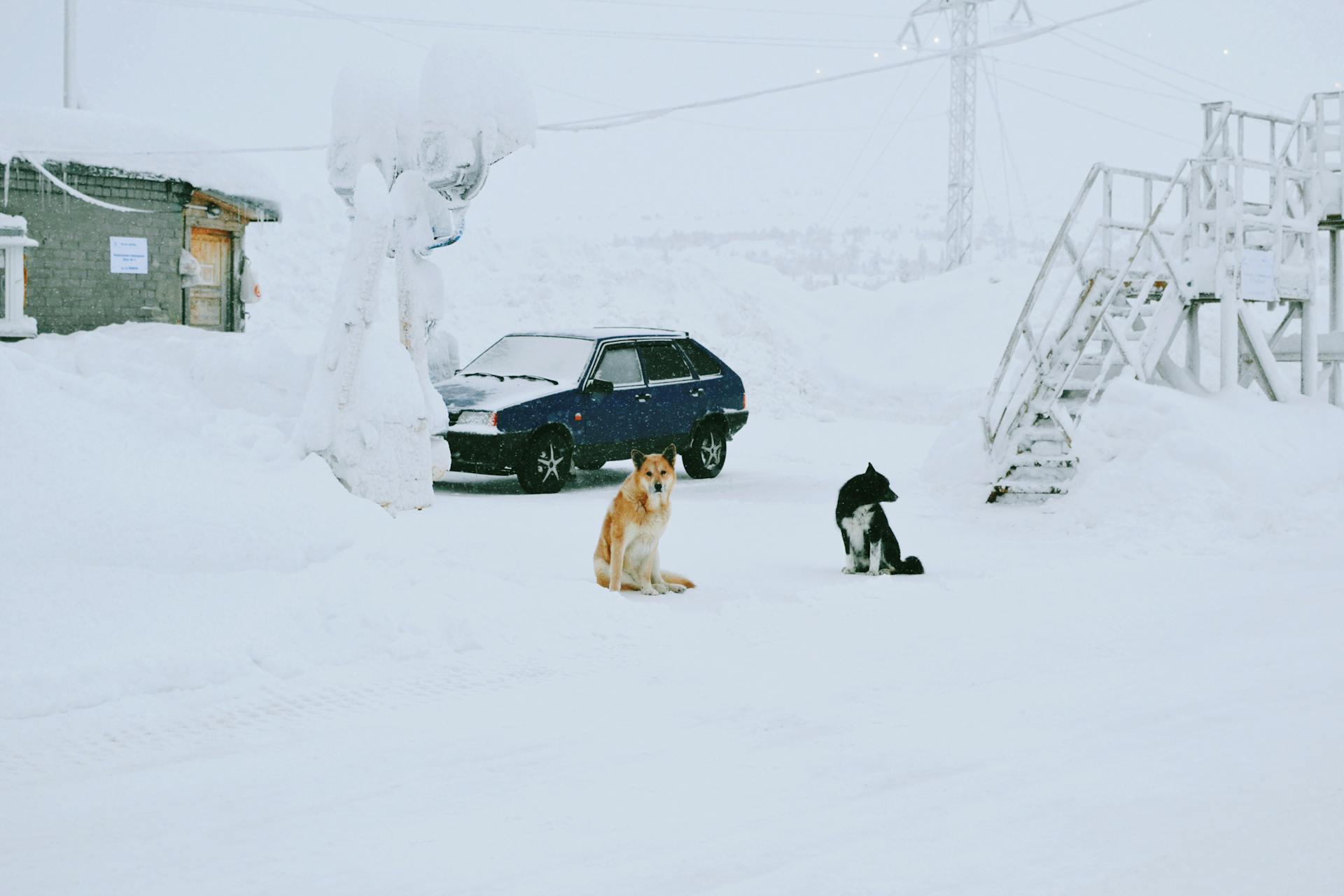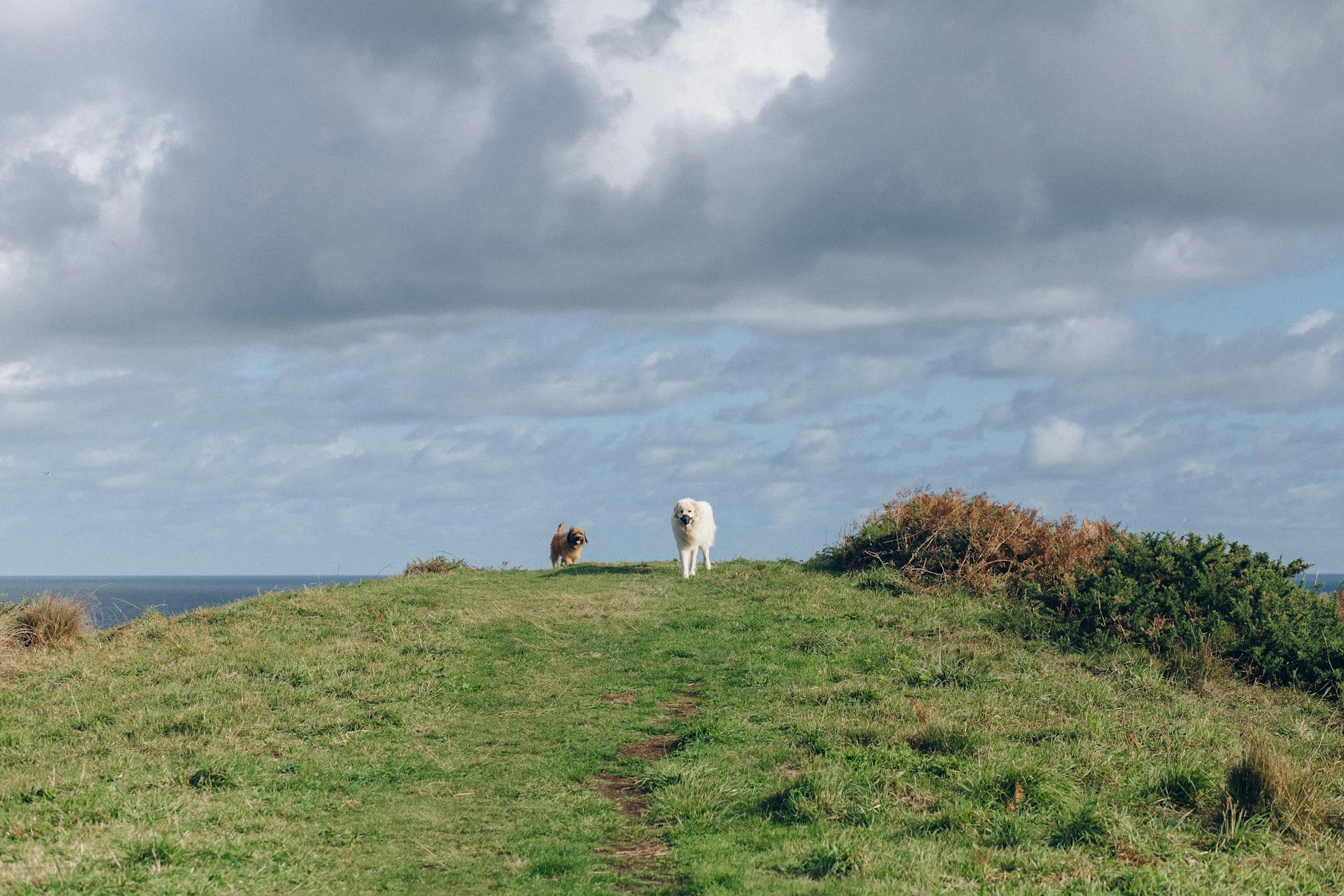
Dogs eating grass is a common phenomenon, but have you ever wondered why they do it? It's not just a quirky habit, but a behavior that serves a purpose.
Dogs may eat grass to help with digestion, as some research suggests that eating small amounts of grass can help move food through their digestive system and alleviate symptoms of gastrointestinal upset.
Some dogs might eat grass due to boredom or lack of stimulation, leading them to seek out other things to chew on.
In fact, a study found that dogs that eat grass tend to be more anxious and have more separation anxiety than those that don't.
Physical Causes
Dogs eat grass to add fiber to their diet, helping to keep their digestive system moving properly. As omnivores, their good health depends on plants as well as high-quality meat.
Eating grass may be an easy way for your dog to get some roughage in their diet, but if they're also showing signs of stomach upset, there may be a medical problem. Dogs can suffer from gastrointestinal issues like pancreatitis and inflammatory bowel disease.
If your dog is eating grass but also has symptoms like lack of appetite, decreased energy, diarrhea, or constipation, it's a good idea to take them to the vet for an examination.
Instinctive Behavior
Dogs may exhibit instinctive behavior, such as eating grass, which is thought to have evolved from their wolf ancestors.
Some scientists speculate that this behavior is rooted in the fact that 2-10% of a wolf's stomach contents may contain plant material.
Wild canids, which include wolves, jackals, foxes, and coyotes, have been observed eating grass.
Relieving an Upset Stomach
Dogs can suffer from gastrointestinal issues like pancreatitis and inflammatory bowel disease, which can lead to eating grass.
If your dog is eating grass and showing signs of stomach upset, such as lack of appetite, decreased energy, diarrhea, or constipation, it's a good idea to take your pup to the vet for an examination.
A nutritious diet with the right amount of fiber can help keep your dog's digestive system moving properly.
Dogs need a balanced diet that includes high-quality meat and plants to stay healthy.
If your dog is eating grass due to a nutritional deficiency, switching to a healthier diet with more fiber may help address the behavior.

Providing plenty of toys, games, and exercise can help prevent boredom or anxiety that may lead to pica behavior.
Here are some signs of stomach upset in dogs:
- Lack of appetite
- Decreased energy
- Diarrhea
- Constipation
These symptoms can be a sign that your dog needs medical attention, so be sure to consult with your veterinarian if you notice any of these signs.
Addressing the Behavior
Addressing the behavior of dogs eating grass requires a multi-faceted approach. It's essential to ensure your dog is getting all the necessary nutrients from their regular diet, as a nutritional deficiency can lead to pica behavior.
To address pica behavior, consult your dog's veterinarian about their diet and any potential adjustments or supplements. A healthier diet, especially one with more fiber, can help alleviate the issue.
If your dog is eating grass excessively, it's crucial to keep an eye on them when they're outdoors to prevent them from consuming chemically treated grass. Consider using natural or organic grass treatments instead.
Here's a list of steps you can take to address the behavior:
- Consult your veterinarian about your dog's diet and potential adjustments.
- Switch to a healthier diet with more fiber.
- Keep your dog engaged and entertained with toys, games, and exercise.
- Monitor your dog's behavior and prevent them from eating chemically treated grass.
Lastly, consider discussing your dog's behavior with your veterinarian to determine if they may benefit from a change in diet or medication to address any underlying digestive issues.
Curiosity
Curiosity is a natural part of a dog's behavior, especially in younger dogs. They often explore with their mouths, which can lead to eating grass or other non-food items.
Some dogs may learn to like the taste of grass, so it's not always a matter of them just trying something new.
Supplementing a Nutrient Deficiency
If your dog is eating grass due to a nutrient deficiency, there are steps you can take to address the issue.
First, make sure your dog is getting all the necessary nutrients from their usual diet. Consult with your veterinarian to determine if any adjustments or supplements are required.
Dogs can develop pica behavior, which is characterized by the consumption of non-food items. If your dog is displaying pica behavior due to a nutritional deficiency, switching to a healthier diet with more fiber can be beneficial.

In one case report, an 11-year-old Miniature Poodle's grass-eating behavior resolved after being placed on a commercial high-fiber diet. This suggests that supplementing a missing nutrient can help alleviate the behavior.
Here are some signs that your dog may be eating grass due to a nutrient deficiency:
- Excessive grass-eating behavior
- Vomiting after eating grass
- Other signs of nutrient deficiency, such as lethargy or dull coat
If you suspect that your dog is eating grass due to a nutrient deficiency, consult with your veterinarian to determine the best course of action.
What to Do If My Dog Eats Grass
If your dog eats grass, the first thing to do is to stay calm and observe your dog's behavior, as some dogs may eat grass due to gastrointestinal upset, which can be a sign of a more serious issue like inflammatory bowel disease.
Some dogs may eat grass due to boredom or lack of stimulation, so providing your dog with plenty of exercise and mental stimulation can help curb this behavior.
If your dog has eaten a large amount of grass, monitor their stool quality closely, as eating grass can cause gastrointestinal upset and potentially lead to vomiting or diarrhea.
Dogs may also eat grass due to nutritional deficiencies, so ensuring your dog is receiving a balanced diet is crucial.
Pet Parent Attention

Other dogs may have learned that eating grass gets them more attention from their pet parents. You might talk to your dog more or offer treats to distract them from the grass.
Pet parents often pull their dogs away from grass, which can actually make them more likely to eat it as soon as they find it - because it's forbidden.
Frequently Asked Questions
What to spray on grass to keep dogs from eating grass?
Spray a 50-50 vinegar-water solution on your grass to deter dogs from eating it, as the acidity will help repel them
Sources
- https://www.nurvc.com/site/blog/2023/10/15/dog-eating-grass
- https://www.siskiyouvet.com/site/blog/2024/02/15/dogs-eating-grass
- https://www.petmd.com/dog/behavior/why-do-dogs-eat-grass
- https://mcgeheeclinic.com/my-dog-eats-grass/
- https://www.guilfordjamestownvet.com/site/blog-greensboro-vet/2023/01/15/dog-eats-grass
Featured Images: pexels.com


